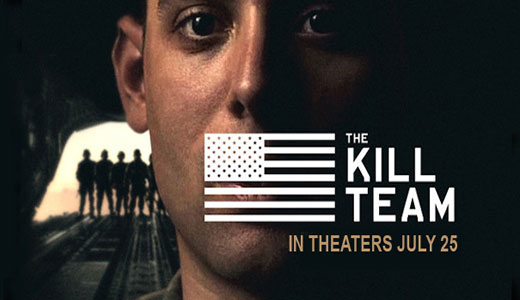
If Chelsea/Bradley Manning is the whistleblower best known for exposing U.S. war crimes in Iraq, another Army Specialist, Adam Winfield, is arguably the most famous truth teller who revealed American atrocities in Afghanistan. Winfield found out the hard way that not only is it tough for those who dare to blow the whistle, but the first casualty of war is still truth.
The 21-year-old infantryman revealed that soldiers of the Fifth Stryker Brigade, Second Infantry Division, deployed near Kandahar, executed Afghans for sport, then planted weapons beside their corpses to “prove” the casualties were “terrorists.” (They also captured these chilling Kodak moments with a series of photos.) Winfield’s reward for trying to report these crimes against humanity was, the moment he stepped off a plane returning to America, to be arrested and charged with premeditated murder. He found himself in the Kafka-esque, Catch-22 trap of becoming a target of a major investigation into war crimes he himself had tried to expose.
Winfield tells a probing camera lens: “War is dirty. It’s not how they portray it in the movies.” But it is how Dan Krauss depicts combat in “The Kill Team,” a hard hitting, award-winning documentary where the fog of war mingles with the haze of hashish.
Focusing on Winfield’s Alice in Wonderland-like trial and tribulations, “The Kill Team” is also a moving family drama. Backing him up every step of the way are Winfield’s Cape Coral, Florida, parents, Emma and Christopher, an ex-Marine. In 2010 Adam tells his father about the wrongdoing in Afghanistan and asks him to inform the Army inspector general. Christopher attempts to alert the military, but to no avail. Even after Adam receives a three-year sentence and bad conduct discharge, his mom and dad unwaveringly believe Adam to be not only innocent, but courageous for standing up for what’s right.
Although some disagree as to whether or not Adam is a whistleblower or murderer — he did not try to stop the killing of Allah Dad and pled guilty to a charge of manslaughter — Krauss’ nonfiction film paints a sympathetic portrait of its protagonist. “The Kill Team” also interviews other members of Winfield’s platoon, such as the conflicted Corporal Jeremy Morlock and Private First Class Andrew Holmes, both charged with the premeditated murder of 15-year-old Gul Mudin. Both were dishonorably discharged and are serving long sentences behind bars.
Pfc. Justin Stoner was assaulted by fellow soldiers after he reported their drug use. Along with the apparently decent Winfield, Stoner is the film’s conscience and hero. Questioning the military’s dehumanization of recruits, the philosophical Stoner ruminates: “Your job is to kill. Then why the hell are you pissed off when we do it?”
The highest ranking soldier charged in this sorry affair is Staff Sgt. Gibbs of Billings, Montana, found guilty of, among other things, three counts of murder. Gibbs looms as a cross between two classic characters from Hollywood’s Vietnam War epics: Marlon Brando as Col. Kurtz in “Apocalypse Now” and Tom Berenger as Sgt. Barnes in “Platoon.” Like them, the gung-ho Gibbs reportedly goes rogue, instigating the Stryker Brigaders’ renegade mayhem and cutting fingers off Afghan cadavers so he can use the bones for a skeletal trophy necklace. Much to his surprise, Gibbs’ running amok on the warpath landed him a life sentence at Fort Leavenworth (where he might have some illuminating tête-à-têtes with fellow inmate Chelsea Manning).
A well known documentarian on the left, Krauss directed, co-wrote, produced, and shot “The Kill Team,” which won the Tribeca Film Festival’s Best Documentary Feature and the San Francisco International Film Festival’s Golden Gate awards. “The Kill Team” unspools slowly, deliberately, told mostly by talking heads. It reminds us that far from being a noble endeavor fought, as Winfield ironically muses, by “a bunch of honorable men with unshakable patriotism,” war is, as Jean Renoir titled his 1937 pacifist masterpiece, “The Grand Illusion.”
While politically aware audiences will appreciate Krauss’ war-is-hell message, this documentary’s real target market are those young impressionable people who have bought into the madness of Washington’s endless imperial misadventures. Adam Winfield wised up. Perhaps, by seeing “The Kill Team,” others will wake up and stay home instead.
“The Kill Team” is rolling out now in theaters across the nation.
Photo: “The Kill Team” official Facebook page












Comments